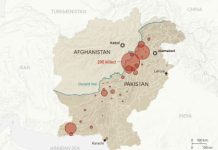Ostensibly, it was not an easy decision for Prime Minister Nawaz Sharif to take part in the swearing in ceremony of his Indian counterpart Narendra Modi. However he finally made it. A decision that virtually caused ripples within the right wing mindset of the country that wanted Prime Minister Nawaz to have certain guarantees on core issues confronting the both countries from the Indian leadership before undertaking the visit. Undoubtedly, those who opposed prime minister’s visit had a valid case and rightful apprehensions. Nevertheless it was perhaps too early to take hardcore standpoint, especially when the incumbent Indian prime minister had not spoken his mind, in detail, in terms of his country’s future course of action, with particular reference to relations with the neighboring countries including Pakistan.
The Indian media was quite skeptical about the visit with many saying it may not take place because according to them Pakistan’s military establishment in particular would never like Nawaz Sharif to go to India. Punjab Chief Minister Shahbaz Sharif met with the Army Chief General Raheel Sharif on May 23, 2014 on behalf of the prime minister to take him on board as well. Military establishment of course would like to have friendly relations with India for it strongly believed in peaceful co-existence with the neighboring courtiers including India, provided New Delhi shows seriousness in addressing dissenting issues between the two countries including the issue of Jammu and Kashmir.
On May 22, the Foreign Office spokesman said disputes including Kashmir, Siachen, Sir Creek, water issues, trade and economic agenda, transnational crimes and people-to-people contacts will have to be taken on.She said Pakistan has expectations that India will come forward for resumption of meaningful and constructive composite dialogue process, so that both the countries could focus on sustainable peace and development of the region.
New Indian government will have to engage with Pakistan in a purposeful dialogue to sort out above mentioned issues because only then progress can be made on others issues such as trade, people to people contacts etc. Surely, these issues cannot be solved overnight but meaningful talks can lead to ultimate settlement. Both in India and Pakistan Modi is viewed as an anti-Muslim politician. Narendra Modi first got ‘fame’ in Pakistan when under his rule about 2000 Muslims were killed in Gujarat in 2002. In 2005 the United States put a visa ban on Modi for what they called supporting the Gujarat riots. Britain ended 10 year diplomatic ban on Modi in 2012.
All said and done, Modi is likely to prove as a strong prime minister as compared with his predecessor Manmohan Singh, who used to take guidelines from party head Sonia Gandhi. Modi instead is likely to take decisions on his own, at least when it comes to managing the internal affairs. On external front, and especially relations with Pakistan, he may not be allowed to take independent decisions, though he may have guts and mandate to assert himself.
Summing up, nearly 40 per cent of population in both countries is leading a life below the poverty line. In both countries there are certain areas where we can find humanity at its worst — even worst than animals. These wretched folks are faced with this situation simply because they do not fall into the priority area of their rulers. Over six decades now, these conflicts and wars have not taken both nations anywhere. Nor would they even in the prospect. It is never too late to bury the hatchet and make a new beginning with a view to genuinely serving the ill-fated electorates, both in India and Pakistan, still longing to reap benefits of true democracy!











